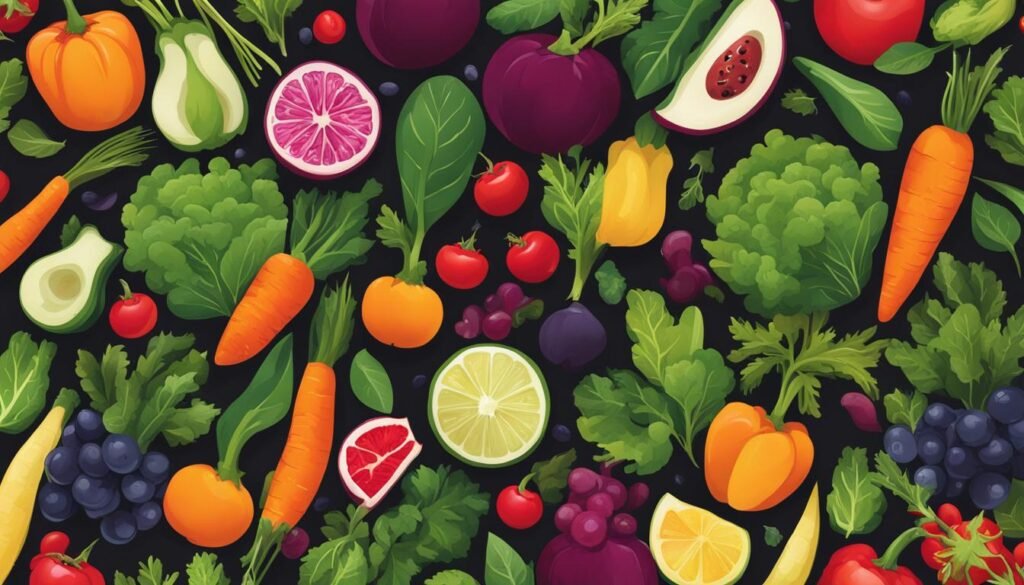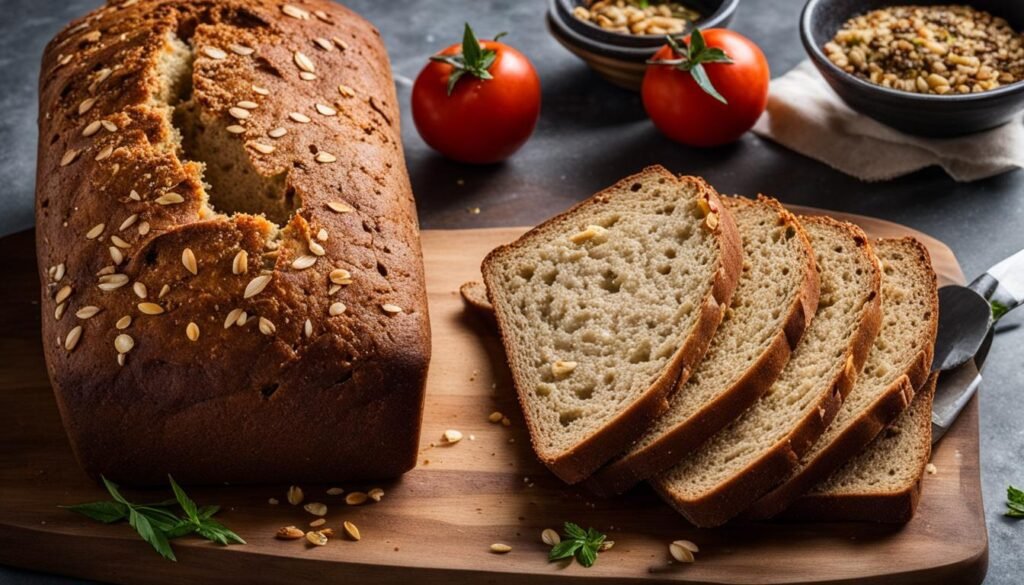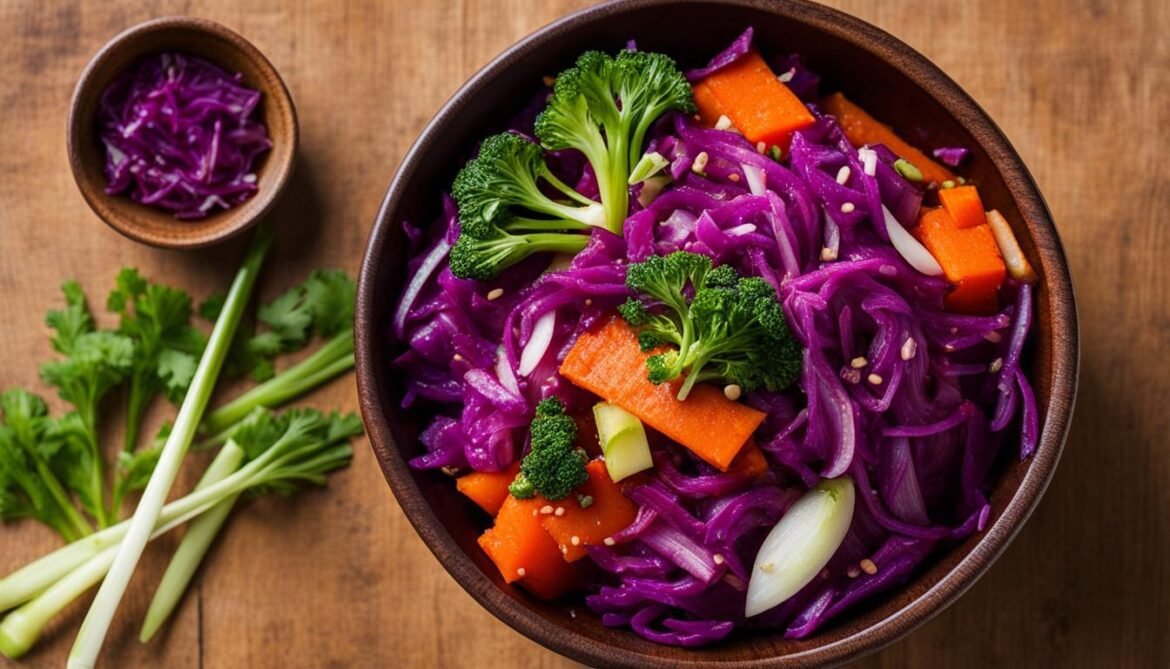Discover the Best Vegan Probiotics Foods for Your Health
While many probiotic foods are dairy-based, there are plenty of plant-based options for vegans to enjoy. In this article, we will explore the top vegan probiotics foods, including fermented vegetables, soy products, and even vegan-friendly supplements.
Probiotic foods play a crucial role in improving gut health and overall well-being. They contain beneficial bacteria that can enhance digestion, strengthen the immune system, and support mental health. Whether you’re already following a vegan diet or simply looking to incorporate more plant-based probiotics into your daily routine, we’ve got you covered.
So, let’s dive into the world of vegan probiotics and discover delicious and nutritious options that will nourish your body from the inside out. Whether you’re new to the vegan lifestyle or a seasoned plant-based enthusiast, there’s something for everyone to explore and enjoy.
What are Probiotics?
Probiotics are living microorganisms, including bacteria and yeast, that naturally reside in our bodies. These beneficial bacteria play a crucial role in maintaining a healthy microbiome and supporting our overall health. There are different types of probiotics, but the main ones found in foods and supplements are Lactobacillus bacteria, Bifidobacterium bacteria, and the yeast Saccharomyces boulardii.
Probiotics are known for their ability to improve digestion, strengthen the immune system, and promote good mental health. They work by restoring the balance of beneficial bacteria in the gut and suppressing the growth of harmful bacteria. By enhancing digestion, probiotics can help alleviate symptoms of gut issues like diarrhea and constipation.
In addition to their digestive benefits, probiotics also have a positive impact on our immune system. They stimulate the production of antibodies and support the growth of immune cells, helping to defend against harmful pathogens and reduce the risk of infections. Probiotics have also been linked to improved mental health, with studies suggesting their potential to alleviate symptoms of anxiety and depression.
In summary, probiotics are beneficial bacteria that have a significant impact on our overall health. By incorporating vegan probiotic foods and supplements into our diet, we can boost our gut health, strengthen our immune system, and improve digestion. Probiotics offer a natural and effective way to promote well-being and maintain a healthy balance of beneficial bacteria in our bodies.

Probiotic Benefits
Probiotics offer a range of health benefits that go beyond just improving gut health. Incorporating vegan probiotics into your daily diet can contribute to an overall enhanced well-being. Here are some key benefits:
- Improved Digestion: Probiotics help regulate the balance of bacteria in your gut, promoting smoother digestion and reducing common gut issues like diarrhea and constipation.
- Enhanced Immune System: A healthy gut is closely linked to a strong immune system. By supporting your gut health with vegan probiotics, you can give your immune system a natural boost and improve your body’s ability to fight off infections and diseases.
- Optimized Gut Health: Even if your gut feels balanced, incorporating vegetarian probiotics into your daily diet can help maintain the balance of your microbiome. This ensures that your gut stays healthy and functions optimally.
- Promoted Mental Health: Studies have shown a correlation between a healthy gut and improved mental well-being. Probiotics can help regulate brain function and reduce symptoms of anxiety and depression.
- Healthy Metabolism: Probiotics have been found to play a role in maintaining a healthy metabolism. They can help regulate appetite, control weight gain, and improve insulin sensitivity.
- Glowing Skin: Your gut health can impact the appearance of your skin. Vegan probiotics can help reduce inflammation, promote a healthy complexion, and alleviate skin conditions like acne and eczema.
By incorporating vegan probiotic foods into your diet, you can reap these benefits and improve your overall gut health and well-being.
“Probiotics are not just good for your gut, but for your entire body. By including plant-based probiotics in your diet, you are taking a proactive step towards a healthier lifestyle.”
Table: Summary of Probiotic Benefits
| Benefit | Description |
|---|---|
| Improved Digestion | Probiotics regulate gut bacteria, reducing issues like diarrhea and constipation. |
| Enhanced Immune System | Probiotics support a strong immune system, aiding in fighting infections and diseases. |
| Optimized Gut Health | Vegan probiotics help to maintain a balanced microbiome for overall gut health. |
| Promoted Mental Health | Healthy gut bacteria positively impact brain function, reducing symptoms of anxiety and depression. |
| Healthy Metabolism | Probiotics regulate appetite, weight gain, and improve insulin sensitivity. |
| Glowing Skin | Improved gut health can lead to healthier skin, reducing inflammation and skin conditions. |
Kombucha

Kombucha is a popular fermented tea beverage that offers numerous health benefits, including being a rich source of probiotics. It is made by fermenting sweetened tea with a symbiotic culture of bacteria and yeast known as SCOBY. The fermentation process creates a fizzy, tangy drink that is not only refreshing but also packed with beneficial bacteria that promote gut health.
Kombucha is known for its probiotic content, which consists of various strains of Lactobacillus bacteria and yeast. These beneficial microorganisms can help improve digestion, boost the immune system, and support overall well-being. In addition to probiotics, kombucha also contains antioxidants and organic acids that contribute to its health-promoting properties.

In recent years, kombucha has gained popularity among health-conscious individuals and those seeking plant-based probiotic options. It is available in a variety of flavors, making it a versatile and enjoyable beverage for many. You can find kombucha in most grocery stores or even try making your own at home using a SCOBY starter kit.
Kimchi: A Flavorful Best Vegan Probiotic Food
Kimchi, a traditional Korean dish made of fermented vegetables, is not only a flavorful addition to meals but also a fantastic source of vegan probiotics. The fermentation process involved in making kimchi creates an environment where beneficial bacteria, such as Lactobacillus and Bifidobacterium, thrive, resulting in a food rich in probiotic goodness.
The Health Benefits of Kimchi

Aside from its probiotic content, kimchi offers numerous health benefits. It contains vitamins C and K, as well as fiber and other essential nutrients. Additionally, kimchi is known for its potential antioxidant and anti-inflammatory properties, which contribute to overall well-being. Incorporating kimchi into your diet may support digestion, immune function, and even weight management. It’s a versatile condiment that can be enjoyed on its own, added to stir-fries, or used to top salads and sandwiches.
| Health Benefit | Explanation |
|---|---|
| Probiotic Support | The fermentation process of kimchi enhances its probiotic content, promoting a healthy gut microbiome. |
| Vitamins and Minerals | Kimchi is a good source of vitamins C and K, essential for immune function and bone health. |
| Antioxidant Properties | The natural compounds found in kimchi may help combat oxidative stress and protect against chronic diseases. |
| Anti-Inflammatory Effects | Some studies suggest that kimchi’s components have anti-inflammatory properties, potentially reducing inflammation in the body. |
| Digestive Health | The fiber content in kimchi can support regular bowel movements and promote a healthy digestive system. |
When purchasing kimchi, look for options that are free from fish sauce or other animal-based ingredients, ensuring it is suitable for a vegan diet. You can find kimchi in most grocery stores or specialty Asian markets. If you enjoy exploring fermented flavors and want to boost your gut health naturally, kimchi is a must-try vegan probiotic food.
Vegan Sauerkraut: A Fermented Cabbage Delight

When it comes to vegan probiotic foods, sauerkraut is a popular choice. Made from fermented cabbage, sauerkraut offers a tangy flavor and a host of health benefits. The fermentation process not only enhances the taste but also promotes the growth of beneficial bacteria that can improve gut health.
One of the key health benefits of sauerkraut is its ability to support digestion. The live bacteria in sauerkraut help break down food and aid in nutrient absorption, ensuring that you get the most out of your meals. Additionally, sauerkraut is a natural source of vitamins C and K, which are essential for immune function and bone health.
When incorporating sauerkraut into your diet, it’s important to choose unpasteurized options. Pasteurization can kill the live bacteria, diminishing the probiotic benefits. Look for sauerkraut in the refrigerator section of your grocery store or consider making your own at home using fermentation kits.
Fermented Soy: Miso and Tempeh
Fermented soybean products like miso and tempeh are excellent sources of plant-based probiotics. These vegan-friendly foods offer a multitude of health benefits and can be easily incorporated into a vegan diet.
Miso
Miso is a savory fermented soybean paste commonly used in Japanese cuisine. It is made by fermenting soybeans with a koji culture, which contains beneficial bacteria. Miso is rich in probiotics, antioxidants, and nutrients like B vitamins. This traditional Japanese staple not only adds depth of flavor to dishes but also provides a host of health benefits.

Tempeh
Tempeh is a fermented soybean cake that originated in Indonesia. It is made by fermenting soybeans with a specific type of mold called Rhizopus oligosporus. Tempeh is packed with probiotics, protein, fiber, and various vitamins and minerals. This versatile ingredient can be marinated, grilled, or stir-fried to create delicious and nutritious meals.
Both miso and tempeh can be used as the base for soups, dressings, marinades, and sauces. They add a unique umami flavor to dishes while providing the gut-strengthening benefits of probiotics.
| Miso | Tempeh |
|---|---|
| High in probiotics | Rich in probiotics |
| Packed with antioxidants | Good source of protein |
| Contains B vitamins | High in fiber |
Both miso and tempeh are versatile ingredients that can be used to enhance the flavor and nutrition of various dishes. Incorporating these fermented soy products into your diet can support gut health and provide valuable probiotics for overall well-being.
Sourdough Bread
Sourdough bread is a popular choice for vegans seeking a probiotic-rich option. Made through natural fermentation using wild yeast and lactobacilli, this type of bread offers a unique tangy flavor and a light, airy texture. But what sets sourdough bread apart is its ability to provide gut-boosting benefits.
During the fermentation process, lactobacilli consume the sugars in the dough and produce lactic acid. This process gives sourdough bread its characteristic tang and also increases its probiotic content. The live cultures present in sourdough bread help to promote a healthy balance of gut bacteria, aiding in digestion and supporting overall gut health.
Additionally, sourdough bread is easier to digest than regular bread due to the fermentation process breaking down complex carbohydrates. This can be particularly beneficial for individuals with gluten sensitivities or digestive issues, as the fermentation process can partially break down gluten and make it more tolerable.
To incorporate sourdough bread into your diet, look for vegan options available at local bakeries or health food stores. Alternatively, you can try your hand at making your own sourdough starter and baking fresh loaves at home. Enjoy sourdough bread on its own, toast it, or use it as a base for sandwiches and other recipes.

Benefits of Sourdough Bread:
- Rich in probiotics, promoting a healthy gut microbiome
- Easier to digest than regular bread
- Potentially more tolerable for individuals with gluten sensitivities
- Delicious tangy flavor and light, airy texture
Plant-Based Milk and Yogurt: Soy and Nut
Plant-based milk and yogurt options are a fantastic way for vegans to incorporate probiotics into their diet. Soy and nut milks are naturally rich in probiotics, and many manufacturers also add live active cultures to enhance their probiotic content. These dairy-free alternatives offer similar gut-strengthening benefits as traditional animal-based yogurt, making them a great option for vegans seeking creamy and tangy probiotic sources without the use of dairy.
| Plant-Based Milk | Probiotic Content |
|---|---|
| Soy Milk | Contains lactobacillus and bifidobacterium strains |
| Nut Milk (almond, cashew, etc.) | May contain lactobacillus and bifidobacterium strains, depending on brand |
Soy yogurt is a popular plant-based alternative to dairy yogurt. It is made from fermented soy milk and contains beneficial probiotic strains. Nut-based yogurts, such as almond or cashew yogurt, can also provide probiotic benefits depending on the brand. These plant-based yogurts can be enjoyed as a standalone snack or used as a creamy addition to smoothies, parfaits, and other dishes.
When selecting plant-based milk and yogurt, be sure to read the labels and choose options that contain live active cultures. This will ensure that you are getting a proper dose of probiotics with each serving. Experiment with different brands and flavors to find the ones that suit your taste preferences best.

Vegan Probiotic Supplements
If incorporating enough vegan probiotic foods into your diet is challenging, probiotic supplements can be a convenient option. These supplements provide a concentrated source of probiotics in the form of capsules or powders. By taking probiotic supplements, you can easily ensure that you are getting an adequate intake of beneficial bacteria to support your gut health and overall well-being.
When choosing vegan probiotic supplements, it is essential to look for products that are specifically labeled as vegan-friendly. This ensures that the supplements are free from any animal-derived ingredients or by-products. Additionally, it’s important to research the brands and look for trusted manufacturers who prioritize quality and effectiveness.
While probiotic supplements can be a useful addition to your health regimen, it’s important to remember that the FDA does not regulate them. Therefore, conducting your due diligence before selecting a supplement is crucial. Reading reviews, consulting with healthcare professionals, and choosing reputable brands can help you make an informed decision.
Probiotic supplements offer various health benefits, including improved digestion, enhanced immune function, and a balanced microbiome. However, it’s always helpful to remember that supplements should complement a well-rounded diet consisting of whole, plant-based foods. Therefore, it’s recommended to consult with a healthcare professional or registered dietitian before incorporating any new supplements into your routine.
FAQ
Q: What are vegan probiotics foods?
A: Vegan probiotic foods are plant-based foods that contain beneficial bacteria, known as probiotics, which can help improve gut health and digestion.
Q: What are the sources of probiotics for vegans?
A: Vegans can get probiotics from various fermented foods and drinks. Some examples include sauerkraut, kimchi, kombucha, dairy-free yogurt, tempeh, miso, and pickles.
Q: How do probiotics help with gut health?
A: Probiotics help promote a healthy balance of bacteria in the gut, which is important for digestion, nutrient absorption, and overall gut health. They can also help alleviate symptoms of digestive disorders like bloating, gas, and constipation.
Q: Are there any dairy-free options for probiotics?
A: Yes, there are dairy-free alternatives for probiotics. You can find dairy-free yogurt made from plant-based sources such as coconut milk, almond milk, or soy milk. There are also dairy-free probiotic supplements available in the market.
Q: Which vegan foods contain probiotics?
A: Many vegan foods contain probiotics. Some examples include fermented foods like sauerkraut, kimchi, tempeh, miso, and dairy-free yogurt. These foods undergo a fermentation process that promotes the growth of beneficial bacteria.
Q: How can consuming probiotic foods benefit my health?
A: Consuming probiotic-rich foods has been linked to various health benefits. It can improve digestion, boost the immune system, support mental health, alleviate inflammation in the gut, and enhance nutrient absorption.
Q: Can probiotics help with mental health?
A: Emerging research suggests that probiotics may help improve mental health by influencing the gut-brain axis. The gut microbiota plays a role in regulating mood and mental well-being, and probiotics can help maintain a healthy balance.
Q: Are all pickles vegan and contain probiotics?
A: Not all pickles are vegan, as some traditional recipes use animal-derived ingredients like fish sauce or dairy. However, there are certified vegan pickles available in stores that do not contain any animal products. Pickles can be a good source of probiotics if they are naturally fermented.
Q: Do fermented dairy products like yogurt have probiotics?
A: Yes, fermented dairy products like yogurt can contain probiotics. However, for those following a vegan or dairy-free diet, there are alternatives available that are made with plant-based milk sources, such as coconut milk or almond milk.
Q: What are some delicious vegan probiotic foods?
A: There are many delicious vegan probiotic foods to choose from. Some examples include dairy-free yogurt, sauerkraut, kimchi, kombucha, tempeh, and miso. These foods offer a wide array of flavors and textures.
